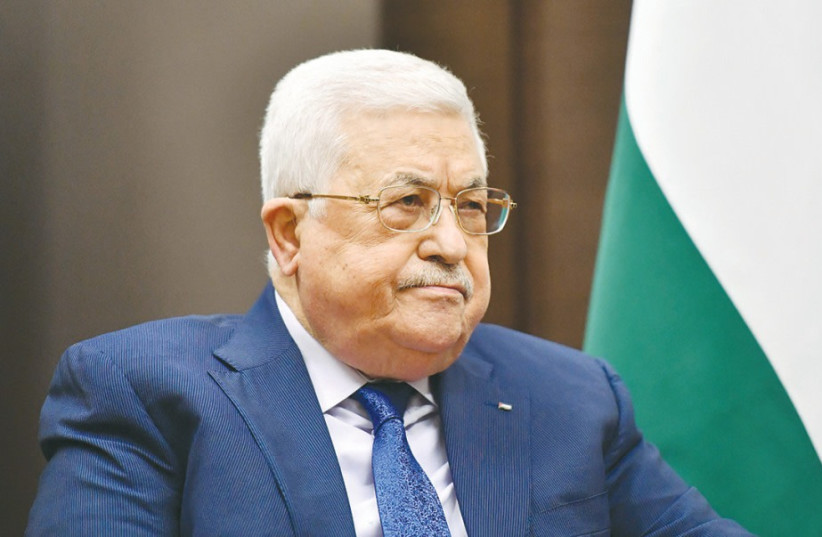A ‘revitalized’ PA can’t be the same policies with a new public face – editorial
The leader of the Palestinian Authority, the man calling the shots there – and who has done so since 2005 – is none other than 87-year-old President Mahmoud Abbas. He sets the PA’s tone and its policies.
This is obvious. So why is it important to point this fact out now? Because some may erroneously believe the resignation of PA Prime Minister Mohammad Shtayyeh on Monday heralds a refreshing, reformative process now under way inside the Palestinian Authority.
It is, however, much too early to draw any such conclusion, because as long as Abbas remains at the top of the pyramid there, all the moves underneath him are largely cosmetic.
Differences between the US and Israel began to publicly emerge regarding the Palestinian Authority and its possible role in the post-war Gaza Strip as early as mid-November.
US President Joe Biden, in a November 18 op-ed in The Washington Post, wrote, “As we strive for peace, Gaza and the West Bank should be reunited under a single governance structure, ultimately under a revitalized Palestinian Authority, as we all work toward a two-state solution.”

Don’t read too much into Shtayyeh’s resignation
That was one of the first uses by Biden of the term “revitalized” in referring to a PA that he believes should have a future role in Gaza. It then became a US catchphrase used often by Biden and other senior US officials, sometimes substituted by another word, “revamped,” and at other times replaced by the word “reformed.”
The meaning behind these words was simple: the corrupt and ineffective PA that has been in control of the Palestinian cities in the West Bank for some three decades cannot rule Gaza, but a revitalized or revamped PA certainly should be able to do so.
Now, a few months after the term “revitalized” gained traction, and following pressure on the Palestinians from the US and the international community to reform the PA, Shtayyeh on Monday announced his resignation.
This step was applauded by the US and the UN, which swiftly said it was an indication of positive changes inside the PA. According to State Department spokesman Matthew Miller, Washington has been engaged with the PA on the need “to reform and revitalize the government and we have seen them start to take steps in that direction, and we welcome them.”
We, however, caution against reading too much into Shtayyeh’s move.
To revitalize and revamp the PA, much more will be needed than to merely replace the prime minister, who – in any event – plays second fiddle to the president, a man who essentially rules by decree.
Netanyahu was right about the PA in November
Early on in the current war, Prime Minister Benjamin Netanyahu was unequivocal in stating that he would never agree to the PA being given control of Gaza and that Israel would neither ignore nor whitewash the PA’s enormous failings.
He has softened his stance somewhat since then, not completely ruling out the PA – nor mentioning it – in the parameters he published last week outlining his principles for the day after the war in Gaza.
Nevertheless, in November, Netanyahu spoke of the PA in terms that are equally valid today.
“We recognize all the bad things that come from the PA, and we don’t ignore them,” he said at a press conference, pushing back against a romanticization of the PA in the West as a benign, peace-aspiring entity.
Among the “bad things” Netanyahu enumerated were that the PA pays terrorists in prison for killing or trying to kill Jews; that the PA educates Palestinian children to a hatred of Israel and a desire to kill Jews and bring about Israel’s disappearance; that Abbas never apologized for the October 7 massacre; and that some PA leaders, such as Jibril Rajoub, articulated hopes to see what happened on October 7 unfold in the West Bank as well.
If a “revitalized” PA means a wholly revamped and restructured PA, with new leaders, new policies, new textbooks, and hands-on input from countries like the United Arab Emirates rather than Qatar, that would be one thing.
If, however, it means just pouring old wine into a new bottle, then that is something else entirely. Shtayyeh’s resignation may be an effort to just replace old bottles with new ones. Seeing his resignation at this point as anything other than that may be little more than wishful thinking.





Comments are closed.